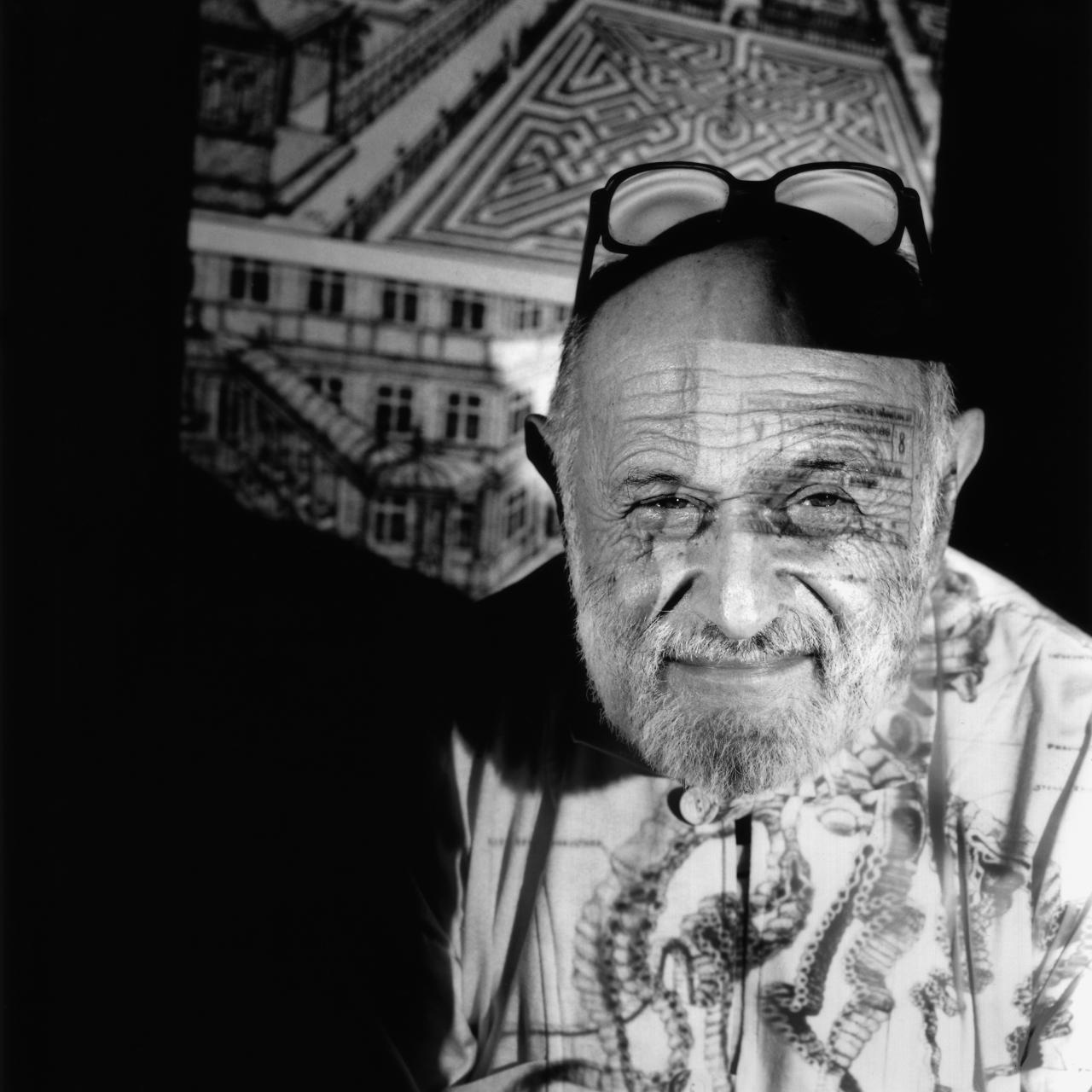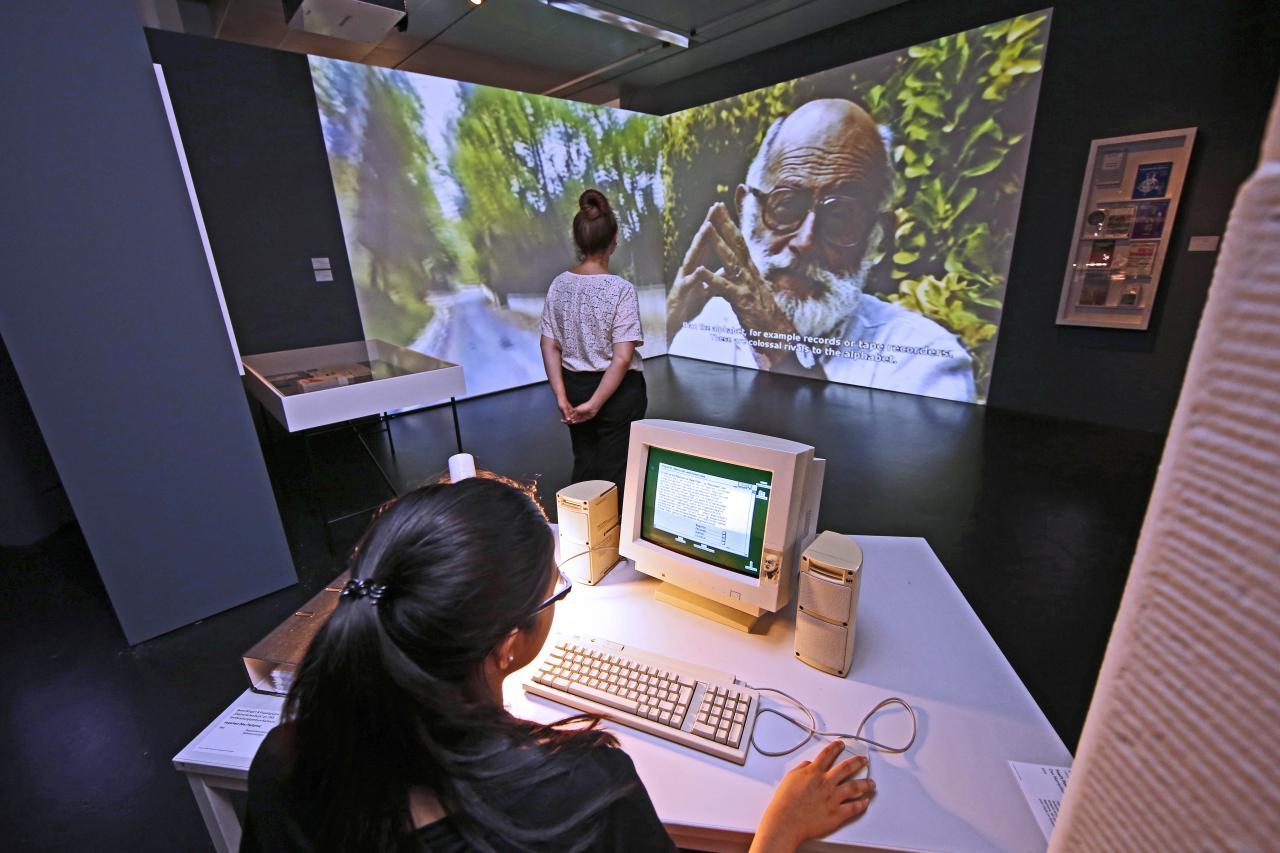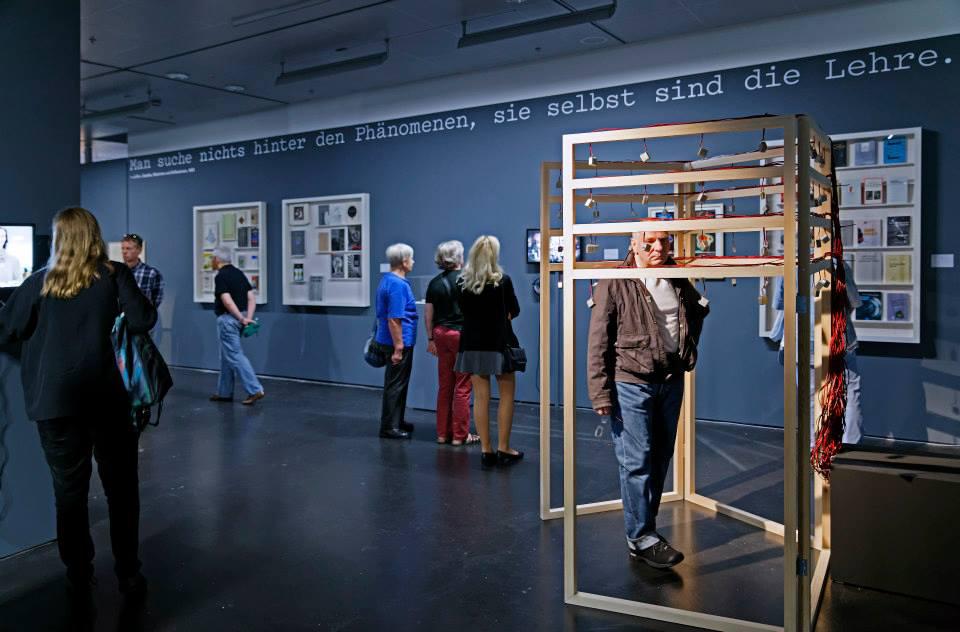Introduction to the exhibtion
Without Firm Ground – Vilém Flusser and the Arts

With texts bearing programmatic titles, such as »Into the Universe of Technical Images« and »Towards a Philosophy of Photography«, Vilém Flusser (1920–1991) became one of the most influential thinkers on communication and media in teh latter decades of the twentieth century. In a supremely positive way he took up the challenge of rethinking the arts in view of the fact that our lives have become highly influenced and determined by technology. His particular variant of anthropology sought to forge a link between scientific methods and a new understanding of culture. Operationally, Flusser distinguishes five steps on his own special stairway to heaven for civilization:
- the multidimensionality of life which we share with animals (the beginning);
- the three-dimensional reality of grasping and handling (hands, tools);
- the two-dimensional reality of images (mental image, representation);
- the one-dimensional linearity of texts and criticism (awareness of history);
- the zero-dimensionality of numbers and algorithms (post-history).

Ed Sommer, »Portrait Vilém Flusser«, 1988/89
© Ed Sommer
The last step in the game of abstraction, however, was not only associated with terrible emptiness for Flusser – as it was for the contemporary riders of the media philosophy apocalypse. In his understanding, this last stage is at the same time the rout to a possible new quality of life, which would have two paradigmatic dimensions:
- dialog, and through dialog the possibility of being close to others – the utopian potential of a telematically connected society;
- a new kind of imagination – »technical imagination« – by which means individuals can achieve self-realization as free, creating and created projects.

»Without Firm Ground – Vilém Flusser and the Arts«, August 2015, ZKM | Karlsruhe. In the front »Hypertext«; in the background »Vilém Flussers Fluss« by Michael Bielicky
© ZKM | Center for Art and Media, photo: ONUK
"Synthetic images are an answer to Auschwitz", Flusser forcefully argued in an interview he gave short before his death. Only by passing through radical abstraction is a new concretion conceivable, and thus also a new and fascinating life. With this post-history begins.
Flusser's thought and writings were a permanent experiment of existing and surviving on the run, in the intellectual diaspora, in his situation forced emigration. Fleeing from the advancing German Army, the 19-year-old Flusser left Prague together with the family of his later wife Edith (1920–2014) for England and then Brazil where he lived for thirty years, primarily in the multicultural mega city of São Paulo. During the military dictatorship in Brazil Flusser returned to Europe where he lived in various provincial towns in Italy and Switzerland, before spending his last ten years in a village in France. But above all else he lived in the academic forums and arenas, which were specially arranged for the passionate orator and in his texts, the majority if which he wrote on a mechanical typewriter with carbon copies for his own archive and for future generations.
»Scribere necesse est, viviere non est« – writing is necessity, living is not. In his life that lacked firm ground Flusser only accepted two worlds as possible homeland:
Flusser's thought and writings were a permanent experiment of existing and surviving on the run, in the intellectual diaspora, in his situation forced emigration. Fleeing from the advancing German Army, the 19-year-old Flusser left Prague together with the family of his later wife Edith (1920–2014) for England and then Brazil where he lived for thirty years, primarily in the multicultural mega city of São Paulo. During the military dictatorship in Brazil Flusser returned to Europe where he lived in various provincial towns in Italy and Switzerland, before spending his last ten years in a village in France. But above all else he lived in the academic forums and arenas, which were specially arranged for the passionate orator and in his texts, the majority if which he wrote on a mechanical typewriter with carbon copies for his own archive and for future generations.
»Scribere necesse est, viviere non est« – writing is necessity, living is not. In his life that lacked firm ground Flusser only accepted two worlds as possible homeland:
- the imaginary and the boundaries-transcening domain of the arts;
- the symbolic experimental field of writing and of texts.

Exhibition opening »Without Firm Ground – Vilém Flusser and the Arts«, August 14, 2015, ZKM | Karlsruhe. In the front: Im Vordergrund: »The Turing Project 3« by Jörg Lindenmaier, Anthony Moore and Peter Simon
© ZKM | Center for Art and Media, photo: ONUK
For Flusser language was code, a code with no mother, unlike »mother tongue«. Yet operatively, most important if all for him was the antiquated and curious High German with its hard consonants that he had learned in Prague's Jewish society, and which enhanced the impact of his charismatic public appearances. With this code as orientation, he would switch from Brazilian Portuguese to French to English – the Esperanto of the telematic communications era – like a player. His contributions to the figure of »homo ludens« were above all invitations to play with words and concepts, with artificial universes.
Always journeying, out of place, not belonging to any academic discipline, and out of time in a twofold sense, this exhibition invites the visitor to embark on a minimal parcours that tracks the fleeting and fleeing life of Vilém Flusser as a model f the violent context that we call the twentieth century. The past, which has become unreal, Flusser confronts with an intensified anticipation of what will characterize the beginning of the twenty-first century – through the media of the arts and his writings.
The Christian Middle Ages relied on humankind becoming immortal in God. The Modern Age placed its trust in humans becoming immortalized through their works. Today, there is only one thing we can strive for: to become immortal in the memories and through the memories of others – »to become immortal in the others«. One can hope for a future in which a life lived is only fulfilled when it is formed and informed together with others. This is how Vilém Flusser ended a lecture manuscript that he wrote in English in the late 1980s.
The idea of an ongoing, never ending dialog in a worldwide, telematic parliament where one reaches agreement, finds orientation, forms views, and delights in intellectual stimulation, has its back to the wall at the beginning of the twenty-first century. Instead, this idea confronts the hideous face of political techno-monsters, like the global surveillance agencies and overwhelmingly powerful monopolists that control and distribute services and commodities. And it has become abundantly clear that communication fosters not only cohesion and communality: it lives off seperations, absences, and it can be channeled into horrendous destruction, technical, ideological, and material.
Vilém Flusser's operational thinking enables us to keep possibilities of acting open for the future(s). Most fundamentally important contributions of European media theory were not developed by sedentary thinkers or those committed to a particular discipline. On the contrary, they were thought through on the move from Saint Petersburg to Paris, between Prague, Berlin and Berkeley or La Jolla, London or the two Cambridges, between Warsaw, Algiers, and Casablanca.
»Without Firm Ground« is an exhibition that focusses on Flusser's thought and his relationship to the arts. The exhibition and the accompanying publications are also conceived as a tribute to all the intellectuals who were caught up in the net of violence cast by the twentieth century and who had to learn to live in exile and as wanderers – not of their own choosing. Their experiences have helped us enormously to a better understanding of the structures in which we live today, but also of the structures of the many variants of communication with and through media.
Our sincere thanks go to all the artists and authors who have so generously contributed their works to this exhibition. As a celebration of diversity and dedication of the global Flusserian community, the publication »Flusseriana – An Intellectual Toolbox«, a tri-lingual glossary of Flusserian terms, edited by Siegfried Zielinski and Peter Weibel with Daniel Irrgang (Univocal Publishing, Minneapolis, MN, 2015) accompanies the exhibition.
The Curators
Always journeying, out of place, not belonging to any academic discipline, and out of time in a twofold sense, this exhibition invites the visitor to embark on a minimal parcours that tracks the fleeting and fleeing life of Vilém Flusser as a model f the violent context that we call the twentieth century. The past, which has become unreal, Flusser confronts with an intensified anticipation of what will characterize the beginning of the twenty-first century – through the media of the arts and his writings.
The Christian Middle Ages relied on humankind becoming immortal in God. The Modern Age placed its trust in humans becoming immortalized through their works. Today, there is only one thing we can strive for: to become immortal in the memories and through the memories of others – »to become immortal in the others«. One can hope for a future in which a life lived is only fulfilled when it is formed and informed together with others. This is how Vilém Flusser ended a lecture manuscript that he wrote in English in the late 1980s.
The idea of an ongoing, never ending dialog in a worldwide, telematic parliament where one reaches agreement, finds orientation, forms views, and delights in intellectual stimulation, has its back to the wall at the beginning of the twenty-first century. Instead, this idea confronts the hideous face of political techno-monsters, like the global surveillance agencies and overwhelmingly powerful monopolists that control and distribute services and commodities. And it has become abundantly clear that communication fosters not only cohesion and communality: it lives off seperations, absences, and it can be channeled into horrendous destruction, technical, ideological, and material.
Vilém Flusser's operational thinking enables us to keep possibilities of acting open for the future(s). Most fundamentally important contributions of European media theory were not developed by sedentary thinkers or those committed to a particular discipline. On the contrary, they were thought through on the move from Saint Petersburg to Paris, between Prague, Berlin and Berkeley or La Jolla, London or the two Cambridges, between Warsaw, Algiers, and Casablanca.
»Without Firm Ground« is an exhibition that focusses on Flusser's thought and his relationship to the arts. The exhibition and the accompanying publications are also conceived as a tribute to all the intellectuals who were caught up in the net of violence cast by the twentieth century and who had to learn to live in exile and as wanderers – not of their own choosing. Their experiences have helped us enormously to a better understanding of the structures in which we live today, but also of the structures of the many variants of communication with and through media.
Our sincere thanks go to all the artists and authors who have so generously contributed their works to this exhibition. As a celebration of diversity and dedication of the global Flusserian community, the publication »Flusseriana – An Intellectual Toolbox«, a tri-lingual glossary of Flusserian terms, edited by Siegfried Zielinski and Peter Weibel with Daniel Irrgang (Univocal Publishing, Minneapolis, MN, 2015) accompanies the exhibition.
The Curators